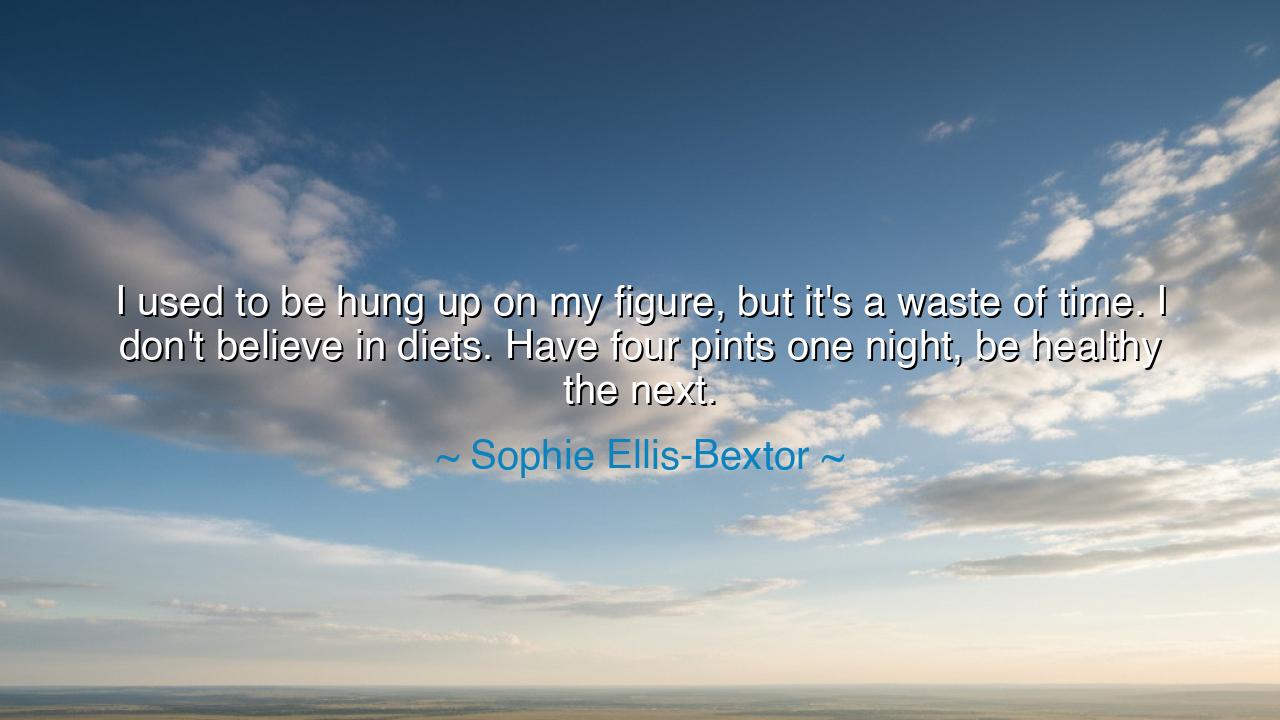
I used to be hung up on my figure, but it's a waste of time. I
I used to be hung up on my figure, but it's a waste of time. I don't believe in diets. Have four pints one night, be healthy the next.






When Sophie Ellis-Bextor declared, “I used to be hung up on my figure, but it's a waste of time. I don't believe in diets. Have four pints one night, be healthy the next,” she was not simply rejecting vanity — she was proclaiming a philosophy of balance, freedom, and self-acceptance. Beneath her playful tone lies an ancient truth: that life, in its fullness, cannot be lived under the weight of constant self-judgment. Her words speak to a generation imprisoned by the mirror, reminding them that peace is found not in perfection, but in harmony — the gentle art of living well without obsession.
In her youth, Ellis-Bextor — like many who dwell in the world of music and fame — once struggled with the relentless gaze of public expectation. Every flaw, every shadow of imperfection was magnified by the lights of the stage. But in time, she came to understand what the ancients had long known: that the body is not an ornament, but a vessel, and its worth is not measured by symmetry or slenderness. To be “hung up” on one’s figure, as she confessed, is to waste the energy that could be spent living, loving, and creating. Thus, when she laughs about drinking “four pints one night” and being “healthy the next,” she is not promoting indulgence — she is celebrating moderation without guilt, the equilibrium that nourishes both body and soul.
Her message echoes the teachings of Aristotle, who spoke of the “Golden Mean” — the path of virtue that lies between excess and deficiency. To starve oneself for beauty is no nobler than to surrender wholly to indulgence; both are forms of slavery. But to live with awareness, to allow joy without gluttony and discipline without severity — that is freedom. Ellis-Bextor’s balance between the hearty and the wholesome is a modern expression of this timeless wisdom. It is the voice of one who has learned that health is not denial, but understanding — not the punishment of the body, but its partnership.
Consider, too, the story of Cleopatra, the queen whose beauty has echoed through centuries. It was not her figure that immortalized her, but her spirit — her wit, her grace, her power of presence. Cleopatra dined richly and lived passionately, yet no chronicler has ever called her immoderate; for she carried herself with the poise of one who knew her own worth. So too does Sophie Ellis-Bextor remind us that confidence, not conformity, is the true measure of beauty. The woman who laughs freely over a pint and rises the next morning to care for her health lives in greater balance than the one who counts every crumb with fear.
In rejecting the tyranny of diets, Ellis-Bextor also challenges the modern illusion of control — the belief that perfection is attainable through rigid calculation. But life, as the ancients taught, is not meant to be mastered; it is meant to be danced with. The tides of appetite, emotion, and experience must flow and recede in rhythm. Her words remind us to embrace the natural cycles — feast and rest, indulgence and renewal — that sustain human joy. To live healthily is not to live narrowly, but to move in harmony with life’s music.
There is wisdom, too, in her tone of ease. For to live without guilt is not to live carelessly — it is to live consciously, trusting oneself enough to enjoy without excess. Many have lost peace chasing perfection, mistaking control for virtue. Yet those who know when to let go, when to laugh, when to enjoy the simple pleasures of life, are the ones who remain truly whole. Ellis-Bextor’s philosophy is not rebellion against health — it is health rediscovered in its purest form: the joyful stewardship of one’s own life.
So let her words be a torch for all who have grown weary of the mirror’s demands. Eat with awareness, but not fear. Celebrate your body as the companion of your spirit, not its cage. Drink deeply from life’s cup, then rest in the calm of moderation. For as Sophie Ellis-Bextor teaches, the art of living well lies not in rigid discipline, but in balance, kindness, and the freedom to enjoy without regret. And those who learn this art will find that their truest beauty — like their truest health — has been within them all along.






AAdministratorAdministrator
Welcome, honored guests. Please leave a comment, we will respond soon